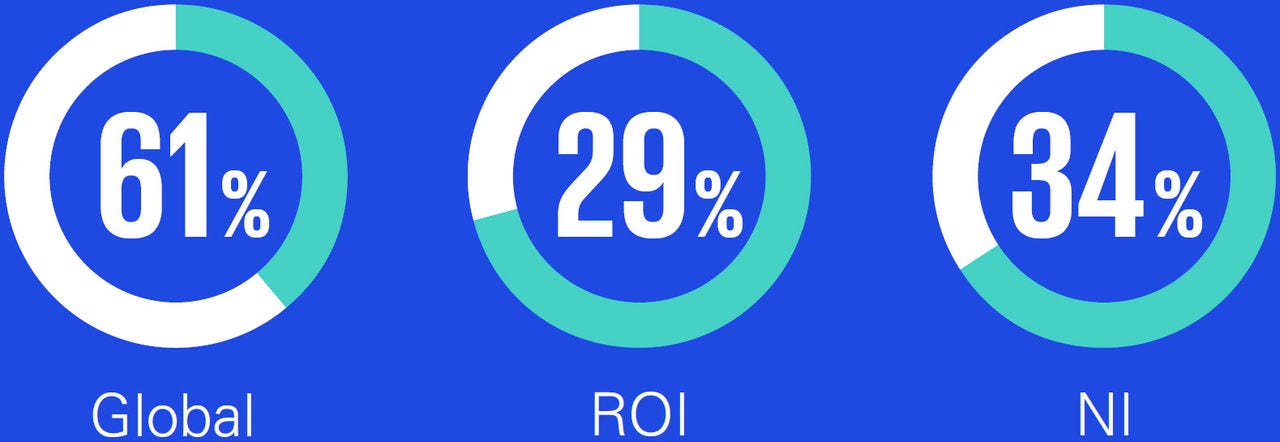CEOs confident we can meet

Competing pressures
For many CEOs, sustainability has become one of the most complex and contested areas of strategy. In principle, the case is clear: it makes business sense, enhances competitiveness, and strengthens both customer and employee advocacy. In practice, however, competing pressures mean that sustainability has slipped down the priority list in some markets. Inflationary pressures, higher interest rates, military conflicts, the redrawing of global supply chains, and divergent regulatory regimes all create headwinds.
If not now, when?
The paradox is striking. At the very moment when climate science warns of narrowing windows to act, many leaders are tempted to slow down. Yet for the entire island of Ireland, as for most advanced economies, delay is a luxury that business cannot afford. Our economies are carbon-import dependent, positioned at the far end of global supply chains, and exposed to both climate risk and cost risk. The sustainability agenda is no longer a “nice to have” or a reputational add-on; it is core to risk management, operational resilience, and future growth.
CEOs increasingly acknowledge the challenge. Many report that sustainability is harder today than five years ago, not easier. Reasons include:
Yet despite these obstacles, CEOs also recognise the dangers of delay. Climate risk is cumulative. Costs mount for those who wait. Stakeholders notice when firms make only cosmetic changes. The risk of being left behind in regulatory compliance, in customer loyalty, in employee engagement — is real.
Adapting to regulation
In 2025, CEOs face an increasingly complex landscape of climate-related rules and reporting standards. Our survey highlights that environmental risks are already recognised as material by 43 percent of NI CEOs and 34 percent of ROI CEOs. While not the top concern, this figure reflects a steady embedding of climate risk into the risk register.
Investment data also shows a divergence. In NI, 37 percent of CEOs report directing resources towards climate and sustainability initiatives, making it one of the top three areas of risk mitigation spend. In ROI, however, sustainability is less prominent, with CEOs allocating more towards supply chain resilience (37 percent) and geopolitical monitoring (31 percent) than to environmental issues. This suggests ROI leaders may be deferring some climate investment in favour of shorter-term pressures — a stance that could prove risky as regulatory timelines tighten.
The European Union’s Corporate Sustainability Reporting Directive (CSRD) is now fully live, requiring companies above certain thresholds to report against European Sustainability Reporting Standards. ROI firms are directly in scope, while NI firms are indirectly affected if they are subsidiaries or suppliers to EU-based multinationals. Compliance is not optional; it requires robust data systems, cross-functional teams, and board oversight. CSRD’s “double materiality” principle is especially demanding as companies must report not just how climate issues affect them financially, but also how their activities impact the environment and society. For many Irish businesses, this means moving beyond incremental sustainability disclosures towards integrated reporting frameworks with audit-ready data.
At the same time, the UK government has committed to sustainability disclosure standards aligned to the International Sustainability Standards Board (ISSB). For NI organisations that trade cross-border, this creates dual compliance: meeting UK standards while also satisfying EU requirements through supply chain relationships.
Evaluating sustainability
Business leaders must contend with voices questioning the cost of sustainability in an era of often stubborn inflation and geopolitical strain. On this island we are particularly vulnerable to carbon pricing, energy volatility, and supply chain disruption.
Interestingly, NI CEOs recorded higher decarbonisation cost concerns as the greatest barrier to achieving net zero (23 percent) than either their global peers, (11 percent) or those in ROI (6 percent). This reflects the rising cost of renewable energy infrastructure, raw materials for clean technologies, and transition planning.
Globally, 25 percent of CEOs cite the complexity of decarbonising supply chains as the single greatest barrier to achieving net zero, broadly in line with those in ROI (29 percent) and NI (31 percent).


Exposure to shocks
Our survey shows that ROI and NI leaders are almost equally aligned on the likelihood of adjusting their strategies in response to these external challenges (69 ROI and 66 percent in NI). This flexibility is valuable but carries risk: if sustainability is the lever most easily pulled back, organisations could undermine their long-term resilience.
Climate events are already affecting supply chains, insurance costs, and infrastructure planning. Cutting back on sustainability initiatives may provide short-term relief but leaves firms exposed when shocks occur.
The KPMG–Eurasia Group 2025 Top Risks report emphasises that climate risk is not receding, even in a world dominated by geopolitical conflict. Climate shocks amplify economic volatility: extreme weather events disrupt energy supply, undermine food security, and escalate insurance losses. Boards that treat climate as a second-order priority misread its systemic impact.
Globally, CEOs are showing stronger commitment to climate goals. In 2025, 61 percent say they are confident in meeting their net-zero targets by 2030, up from 51 percent in 2024 — a ten-point increase in just a year. However, ambitions on this island are lower with 29 percent confident of hitting net zero by 2030 in ROI and 34 percent in NI.
At the same time, 51 percent of CEOs are prioritising compliance and reporting standards to meet investor and regulatory demands, while 44 percent say they are aligning sustainability goals directly with their core business strategy. However, barriers remain beyond cost and skills, CEOs cite political uncertainty, inconsistent carbon pricing, and lack of infrastructure as constraints.
Leveraging AI for climate action
Effective action against climate change can be supported by the strategic adoption of artificial intelligence.
Our research shows a strong majority of CEOs in the Republic of Ireland (71 percent) believe that AI is instrumental in reducing emissions and enhancing energy efficiency. This sentiment is echoed by 74 percent in Northern Ireland, and 78 percent globally.
In addition, 79 percent of CEOs worldwide believe AI can improve sustainability-related data quality and reporting, and 79 percent see it as key to identifying opportunities for resource efficiency. These figures underscore the emerging consensus that technologies such as smart grids, data-driven optimisation, and predictive analytics are converting sustainability ambitions into measurable outcomes.
Practical applications are already taking hold. Manufacturing firms are using AI-powered sensors to monitor energy use in real time, identifying inefficiencies that can cut costs while reducing emissions. Logistics companies are applying predictive analytics to optimise delivery routes, reducing fuel consumption and carbon footprint. Energy providers are deploying AI in demand forecasting for renewable generation, balancing grid supply as wind and solar fluctuate.
Globally, agribusinesses are applying AI to soil and weather data to predict crop yields and reduce fertiliser use, simultaneously improving sustainability and profitability.
In the ROI, 66 percent of organisations also recognise AI’s value in enhancing risk modelling, with Northern Ireland reporting an even higher rate at 77 percent, followed by 78 percent globally.
For Russell Smyth, Head of Sustainable Futures and Corporate Finance at KPMG in Ireland, predictive accuracy and scenario planning are critical to resilience in an era of climate volatility: “AI has a role to play in modelling climate-related risks and ultimately supporting better decision-making and long-term planning.”
Yet, the rapid growth of AI, and the digital infrastructure that supports it, brings its own environmental challenge, adding pressure to already stretched power grids. As Smyth notes, “Scaling technological infrastructure must go hand in hand with investments in renewable energy solutions if businesses are to be truly resilient.”
This is especially relevant on this island, where limited indigenous energy resources heighten dependency on imports. Linking AI deployment directly to renewable energy integration — from offshore wind forecasting to real-time grid optimisation — offers a pathway for CEOs to demonstrate that technology can reduce both risk and cost while accelerating the transition to low-carbon growth.
The AI data benefit
Meanwhile our survey shows that while 77 percent of respondents in ROI and 83 percent in NI believe that AI can improve sustainability related data quality and reporting, 31 percent of CEOs note that they don’t yet have their own resources to implement new sustainability and ESG reporting standards.
According to Emer McGrath, Head of Audit at KPMG in Ireland: “While AI provides a real opportunity to improve sustainability related data and reporting, which can help sharpen strategy, build trust, and support competitive advantage, almost one-third of CEOs say they lack the internal capability to achieve sustainability compliance.”
Sustainability has become harder, not easier. Legislation varies wildly and the complexity can appear endless. But we must not lose sight of the fact that sustainability makes business sense, builds advocacy, and particularly given our carbon dependencies and supply-chain vulnerabilities, is an issue CEOs cannot ignore.
Actions to consider
Ireland’s CEOs are ready.
Are you?
Chat with our leadership team about how the trends uncovered in CEO Outlook 2025 apply to your business and sector - connect with us to turn insight into action.






